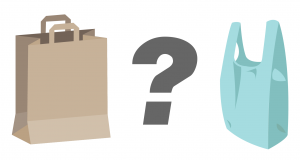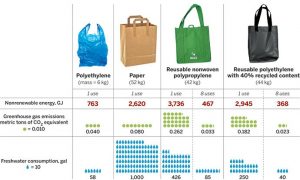On January 1, 2022, the Plastic Ban is officially taken effect as announced by the Provincial Government of British Columbia (BC) to make the environment greener. The residents start to use reusable bags either willingly or reluctantly. Stores and markets offer a variety of reusable bags or paper bags to encourage people bring their own bags while shopping. Be Fresh Local Market, for example, even created a “Reusable Bag Library” to help people quit plastic bag. However, is abandoning plastics really helping with environmental improvement?

Image via Climate Kids
Disposable vs Reusable
So far, the whole point of abandoning plastic and encouraging reusable bags is to arouse people against environmental harm. Alas, as we all know that plastics are infamous for their difficult recyclability and lifetime biodegradation, it is surprising to find out that plastic bags do have some assets compared to reusable bags. According to a science blog, Plastic Bag and the Environment, posted on Bag the Ban, a project of the American Recyclable Plastic Bag Alliance (ARPBA), plastic bags actually require the much less energy and water to manufacture compared to nearly all other bags as shown in the chart below. As by-products of natural gas, plastics also produce much less greenhouse gas emissions. Finally, when disposed, plastic bags in fact take up less spaces than reusable bags.
That’s right. Reusable bags are not reusable forever and will be disposed eventually.

Image by Joseph Greene via California State University, Chico, Research Foundation
Reusable bags are becoming popular due to the plastic ban. Most reusable bags are made from fabrics. Although reusable bags are durable and so more eco-friendly than plastic bags, reusable bags are not once-for-all solution to environmental improvement. Reusable bags are prone to contaminate groceries due to its materials, for they need frequent cleaning and laundering, leading to the increased use of water and detergents. On another material aspect, reusable bags sold from most stores have business design print. When it comes to manufacturing, a material called polypropylene (PP) is commonly used. Notably, PP is a non-renewable and non-compostable or biodegradable source. Lastly, the most worrisome aspect for reusable bags is that they have potential hazards of lead, which is toxic and poisonous to human bodies if the groceries are contaminated even though the amount is still questionable.
Plan For Now but New Discovery
Despite pros and cons of plastic and reusable bags, it is undeniable that plastic pollution has become a global issue. The good news is that scientists now discovered a type of bacteria that feeds on plastics. The video below is a TED Conferences (Technology, Entertainment, Design) talked by Morgan Vague on her research with microbiologist Jay Mellies on such bacteria.

This new discovery has great potential in solving the current plastic crisis and re-prospering the plastic industry. Until further research on that subject, BC residents are still finding their ways to transition from the convenience of plastic bags, and reusable bags seem to be the only option left for now.
~Evelyn Zhong
